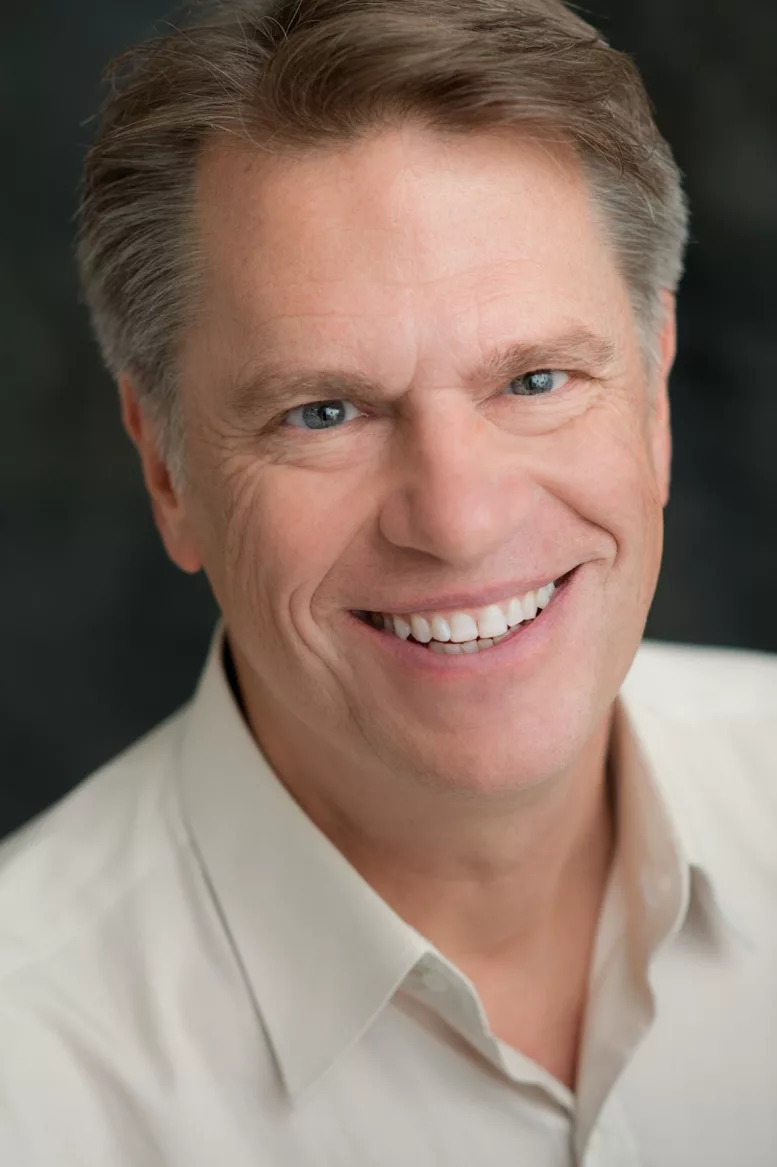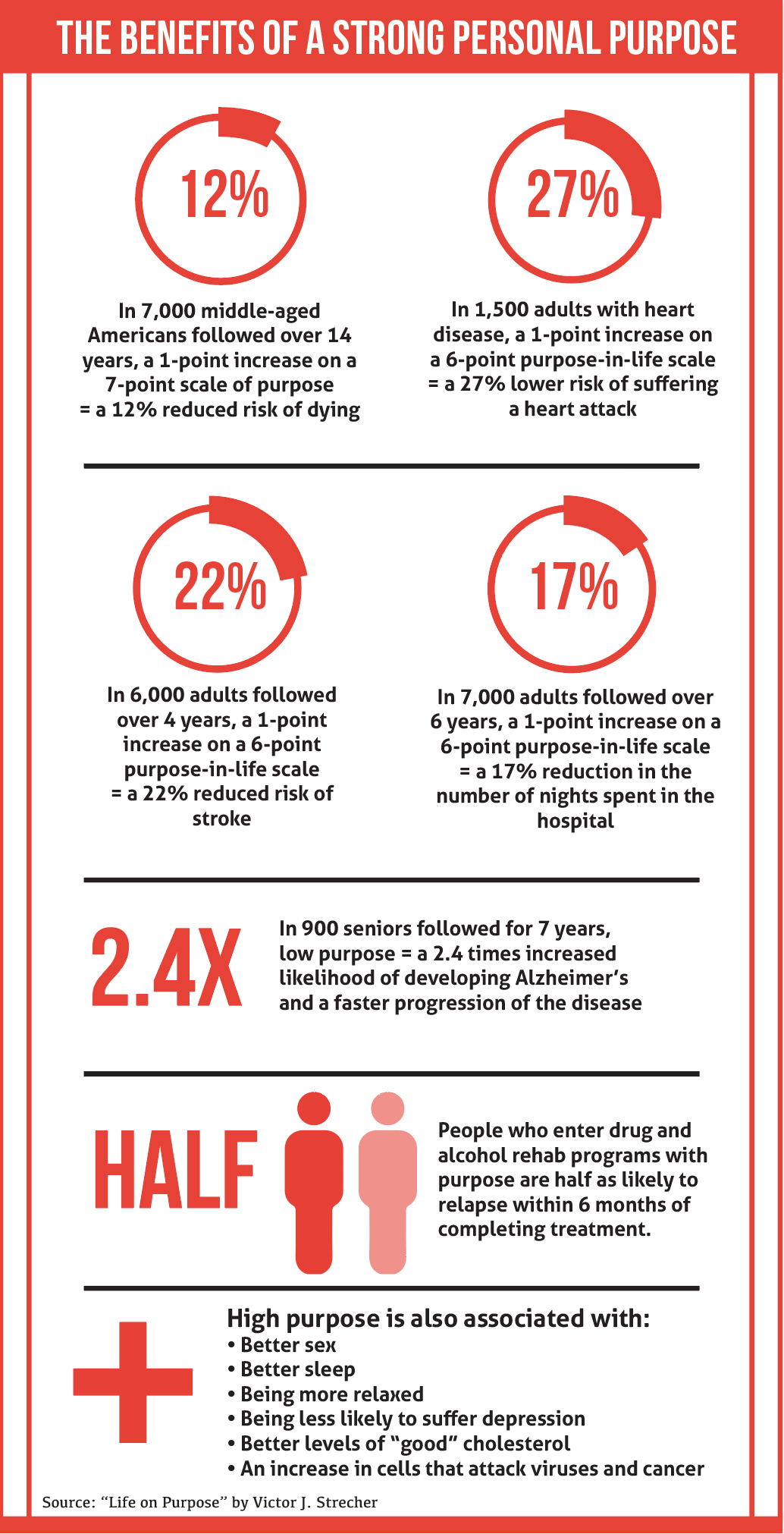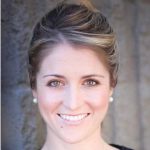“Imagine a drug that was proven to add years to your life, reduce risk of heart attack and stroke, cut your risk of Alzheimer’s disease by more than half, help you relax during the day and sleep better at night, double your chances of staying drug- and alcohol-free after treatment, activate your natural killer cells, diminish your inflammatory cells, increase your good cholesterol, and repair your chromosomes. What if this imaginary drug reduced hospital stays so much that it put a dent in the national health care crisis? The pharmaceutical company who made the drug would be worth billions. The inventors of the drug would receive Nobel Prizes and have institutes named for them. But it’s not a drug. It’s purpose. And it’s free.”
— Vic Strecher, “Life on Purpose”
Why am I here?” “What really matters?” “What makes a good life?” These are the types of questions philosophers and mystics have been asking for eons — and not inquiries we usually associate with either business or public health. But the research is increasingly clear: having a strong purpose is a powerful key that unlocks both business success and human wellbeing. That’s why researcher, professor, and entrepreneur Vic Strecher has dedicated himself to elucidating the connections between purpose and wellbeing and spreading the gospel of purpose to all.
Strecher, who is director of innovation and social entrepreneurship at the University of Michigan’s School of Public Health, actually has four purposes:
- to teach every student as if they were his own daughter,
- to be an engaged husband and father,
- to enjoy love and beauty,
- and to help others create a purpose in their lives.
But he wasn’t always so articulate about his reasons for being. It’s not that he was aimless as he built a career as a professor and started a health media company that he sold to Johnson & Johnson in 2008, but neither was his aim in life very clear. Then, in 2010, his daughter Julia died at age 19 of a heart condition. Strecher found himself adrift on an ocean of grief, until he eventually made his way to the scientific study of purpose and its power to change human lives. Since then, his commitment to purpose has spurred him to write two books on the subject and to found a digital solutions company, JOOL Health, that helps workers improve wellbeing by developing — and aligning daily with — their purpose.
We spoke with Strecher about how powerful purpose is and what business leaders should make of the latest research.
What’s the most surprising thing you’ve learned through your work on purpose?
Vic Strecher: How the most modern research is validating the most ancient philosophy. The Buddha, Aristotle, Seneca, Michel de Montaigne, Nietzsche, the famous existentialist philosopher Albert Camus, Viktor Frankl, who wrote “Man’s Search For Meaning” — when you go back through that lineage, you see people talking about the importance of purpose, about examining your life. Socrates once said, “The unexamined life is not worth living.” Aristotle essentially then said, “Yeah, but the purposeless life isn’t worth examining in the first place.”
Those edicts that we all thought were nice, but … philosophy? How important is philosophy now? Well, they’re being borne out in science. We find that people with a strong purpose literally have their DNA repaired more effectively, they have more antibodies and fewer pro-inflammatory cells. We find that people with a stronger purpose live longer.
A fairly new study showed that, controlling for a baseline of income, after six years people who had a strong purpose had made more money and had higher net worth. We’re finding that purpose, something the ancients talked about a lot, turns out to be a really important factor in your health and in your life.
 How do you define purpose?
How do you define purpose?
VS: A set of goals linked with your core values. That’s it. You have different domains of purposes. You have a work purpose, a family purpose, a personal purpose, a community purpose. We’ve known for 30 years in organizational management that setting a goal works so much better than just saying, “I’m going to do my best.” Purpose is just a meta-goal based on your deepest core values.
So, you don’t think of it as people having just one singular purpose — “this is why I’m here”?
VS: Right. When you look at your purpose in these different domains, you realize one overall, overarching, vague purpose doesn’t cut it. That is not how I think about it, and I don’t think about Hallmark-card-type purposes, like “I want to do good in the world.” It’s not authentic. What I’m after are purposes and mission statements from individuals and authentic mission statements from businesses. (Learn more about creating yours with Strecher’s 6-step process.)
What’s the relationship between purpose and work, or business?
VS: Thinking more about your purpose is really designing your life. It’s rejecting, “I’m going to live my life in accordance with a cookbook,” whether that’s a cookbook religion or what TV tells you. It’s saying, “I’m going to live a life that I’ve designed.” And a “transcending” life is simply saying, “I’m going to do things bigger than myself.”
When you think about an organization then, and the transcendence of an organization, you start having to ask, “What is my business here to do in the big picture? What kind of legacy should this business leave on this planet? Should it just be about making money? Do we just want to create the richest people in the graveyard, or do we want to do something bigger and leave a positive legacy?” When you start thinking in that different way, oddly enough, you start making more revenue.
Meanwhile, if you’re thinking about becoming an employee in a company, it’s important that you look at its mission and purpose and decide whether that’s something you want to be aligned with, because this is a big part of your life.
How about people who have jobs that seemingly don’t have a lot of purpose?
VS:
Purpose isn’t just for upper-middle-class yuppies who are doing something socially responsible.
People are finding purpose in just about any kind of job. Jane Dutton, a psychologist in the Ross Business School at the University of Michigan, has studied this. She interviewed custodians at the University of Michigan’s hospital and asked, “Do you have a purpose at work?” A bunch of them said, “Yeah, it’s to make money, and I don’t make that much.” In other words, their purpose was not very strong. But others said, “I’m part of the medical team. Ifthere’s a person in a coma for a couple of months, I’ll put a fresh flower in front of her face every morning. Just in case she wakes up, the first thing she’ll see is something beautiful.” Or, “There’s a child dying of cancer whose parents are never able to be there. I sit and read her stories. I’m part of the medical team.”
Those people tend to never be absent. They are happy at their work, they feel they’re part of the team, and the team feels that they are indeed connected. That’s what I mean by purpose. Dutton calls it “job crafting.”
Does the organization itself have a role to play in helping people find purpose by “job crafting”?
VS: Yes. Absolutely. That hospital could choose to save a little money by rotating the custodians around different parts of the hospital. Suddenly that destroys the “I am part of the team” approach. They’re now just a robot, hired to go clean any floor that happens to be available. If you ask the medical team, “Are your custodians a part of your team?” and they say no, that’s a problem.
What about the fact that many self-transcending jobs, like nonprofit work or social work or teaching, tend to pay poorly?
VS: I might refer you to a New York Times bestseller list book called “Give and Take,” by Adam Grant, an author from the University of Pennsylvania and the Wharton School of Business. He’s found very clearly that altruistic behavior results in much happier people and much more productive, successful people.
On the other hand, right away, he says, “Look, there are people who give, give, give all the time and they get taken, essentially.” You can be a sucker, and a lot of people can just spend their whole lives doing nothing but giving. He talks about this intermediate goal, something in between giving and taking: enlightened giving. You’re giving, but you also understand that you’ll receive something because of that giving.
In terms of specific professions, you could get into a giving profession where all you’re doing is giving. But if you’re trying to help a lot of people, you may turn that into a business. That business can reach lots of people. In fact, many times it reaches more people than the social service agency you’re involved in. You may see ways to innovate and say, “I don’t like the social work agency that I’m in right now. It’s not doing anything.” And if you’re real honest with yourself, you say, “I’m actually not giving that much. How can I give more? I could do it by forming a business.” That’s what I did with Health Media and that’s what I’m trying to do with JOOL Health right now.
What do you wish all CEOs and business leaders knew about purpose?
VS: Revenue-transcending purposeful business is good business. Having a revenue-transcending mission will end up resulting in better outcomes for your shareholders. If your company is only about shareholder value, your shareholders will get less revenue . And if you try to pretend that you’re interested in something beyond shareholder value but you’re really only interested in shareholder value, you’ll fail.
The real leaders are those who can get people to go through difficult circumstances, uncertainty, and still follow them over that hill. You can only do that with a transcending mission. Something bigger than yourself.

 How do you define purpose?
How do you define purpose?



